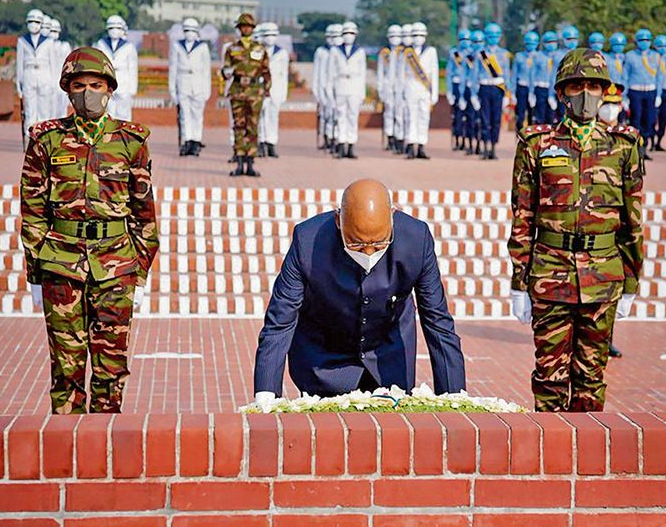Dhaka: Asserting that it was time to raise the bar of “deep friendship” between India and Bangladesh “even higher”, President Ram Nath Kovind Thursday said New Delhi remained committed to assist Dhaka in realising the full benefits of the bilateral relationship.
“History will always bear witness to this unique foundation of our friendship, forged in the people’s war that liberated Bangladesh,” Kovind said at an event held at the National Parliament of Bangladesh to celebrate the Victory Day and birth centenary year of the nation’s founding father Bangabandhu Sheikh Mujibur Rahman.
The president, who earlier attended the Victory Day Parade as the Guest of Honour, said India has always attached the highest priority to its friendship with Bangladesh.
“We remain committed to doing all we can, to help realise the full potential of our friendship,” he said.
In recent years, the two neighbours have seen steady expansion of trade, economic cooperation, people-to-people ties, student exchanges and extensive engagements across multiple areas of activity.
“These are guarantees of a sustainable, deep friendship, based on mutual respect, sovereign equality and our respective long-term interests,” Kovind underlined, as the two countries celebrate 50 years of ties alongside the golden jubilee celebrations of Bangladesh’s independence from Pakistan.
He said if the first 50 years of “our partnership began by surmounting extraordinary challenges that forged a deep friendship between our people, perhaps the time has come to raise the bar even higher”.
To achieve that, Kovind said, businesses, academics and especially youths of both the nations must be motivated to jointly create globally-pioneering initiatives in the world of ideas, creativity, commerce and technology.
“Our innovators should be urged to find new solutions, based on locally-appropriate technologies, to address our common development challenges.
“We must urge our thinkers to leverage the power of our own unique success stories, to find ‘best-in-class’ ideas that are relevant in our regional context. Together we can create opportunities for seamless flow of ideas and innovation as we enter a new era of inter-connectivity,” he said.
The president said Bangladesh’s “stellar economic performance” complemented by geographical advantage can benefit the entire sub-region and the world.
“There is a growing recognition among international experts about the fact that close sub-regional trade, economic cooperation and connectivity will help accelerate the process of achieving a Shonar Bangla (Golden Bangladesh) in the shortest possible period of time,” Kovind said.
He said businesses of both the countries should be encouraged to realise the vision of deeply-integrated supply chains of production and transport connectivity, “enabling our sub-region to become one of the world’s largest production centres, and the world’s largest market for goods and services”.
Congratulating Bangladeshis on the occasion of Victory Day, Kovind, without naming Pakistan, said, “Seldom has humanity witnessed sacrifices on a scale so epic as during the 1971 War of Liberation. Your struggle for freedom has a special place in the hearts of every Indian, especially those of my generation.”
The war in 1971 broke out after the sudden crackdown past midnight on March 25, 1971 in the erstwhile East Pakistan by the Pakistani troops and ended on December 16. The same year Pakistan conceded defeat and unconditionally surrendered in Dhaka to the allied forces comprising freedom fighters and Indian soldiers.
Officially three million people were killed during the nine-month long war.
“History”, Kovind said, “also has few examples to equal the scale of empathy and grass-root-level support that your struggle evoked in India. People spontaneously opened their hearts and homes to offer all possible support to the people of Bangladesh…History will always bear witness to this unique foundation of our friendship, forged in the people’s war that liberated Bangladesh.”
The president said a little over 50 years ago, the vision of an independent Bangladesh inspired millions. But it seemed a remote and impossible dream then to naysayers, sceptics and detractors.
The international context, and realpolitik seemed to rule out the prospects of Liberation. Set against a brutal, determined and well-armed foe who would stop at nothing, the odds were very much against Bangladesh.
“But the inspiring statesmanship of Bangabandhu; his clear-sighted moral conviction and his unflinching determination to seek justice for the people of East Pakistan were truly the game-changers. As a result, the world learnt a valuable lesson: that the will of the majority of people cannot be subjugated by any force, however brutal,” he said.
Kovind recalled that as a youth, he too was inspired by Bangabandhu and was “electrified by his powerful voice, and the understanding that it carried the aspirations of 70 million people of Bangladesh at that time”.
Bangladesh Prime Minister Sheikh Hasina chaired the event titled ‘The greatest hero of the glorious victory’, while President M Abdul Hamid joined as the chief guest at the event.
“I recall with deep appreciation the unstinting moral and material support that the political leaders and people of India extended to Bangladesh during our War of Liberation,” Hamid said.
“(Simultaneously) I remember with profound respect the heroes of Indian armed forces who sacrificed their lives in our great Liberation War,” he added.
Noting that Prime Minister Narendra Modi had attended the opening of the birth centenary and golden jubilee celebrations in-person in March, Hamid expressed hope that the visit of President Kovind will further strengthen the friendly relations between the two countries.
“The relationship between the two countries, which started in 1971 during the War of Liberation, has now reached a new height,” he said.
PTI
